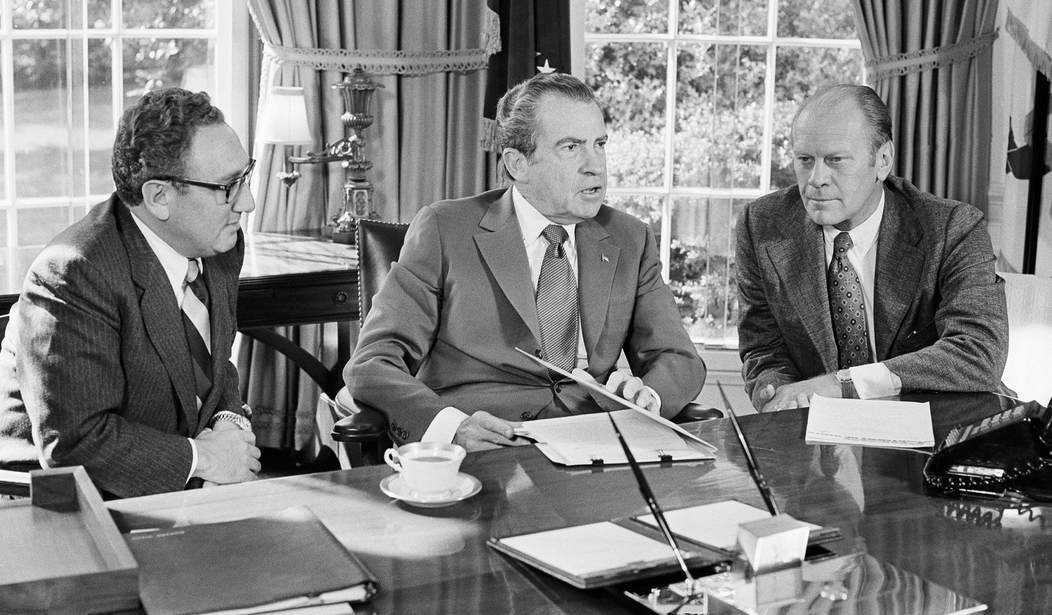It is welcome news that President Trump will pull the United States out of the Paris climate agreement. The pact promises to damage the economy while surrendering American sovereignty over climate policy to yet another international, largely anti-American enterprise.
It is unwelcome news, nevertheless, that so much was riding on the president’s decision to withdraw the assent of his predecessor, Barack Obama — America’s first post-American president.
In reality, Trump’s decision is monumental only because America, in the Obama mold, has become post-constitutional.
The Paris climate agreement is a treaty. We are not talking here about a bob-and-weave farce like the Iran nuclear deal. That arrangement, the “Joint Comprehensive Plan of Action,” was shrewdly packaged as an “unsigned understanding” — concurrently spun, depending on its apologists’ need of the moment, as a non-treaty (in order to evade the Constitution’s requirements), or as a binding international commitment (in order to intimidate the new American administration into retaining it).
The climate agreement, to the contrary, is a formal international agreement. Indeed, backers claim this “Convention” entered into force — i.e., became internationally binding — upon the adoption of “instruments of ratification, acceptance, approval or accession” by a mere 55 of the 197 parties.
For all these global governance pretensions, though, why should we care? Why should the Paris agreement affect Americans?
Yes, President Obama gave his assent to the agreement in his characteristically cagey manner: He waited until late 2016 to “adopt” the convention — when there would be no practical opportunity to seek Senate approval before he left office. But Senate consent is still required, by a two-thirds supermajority, before a treaty is binding on the United States.
At least that’s what the Constitution says.
But it is not what post-American, transnational progressives say.
They note that in 1970, President Richard M. Nixon signed a monstrosity known as the Vienna Convention on the Law of Treaties. Think of it as “the treaty on treaties” — even though you probably thought we already had an American law of treaties.
Under Article 18 of the treaty on treaties, once a nation signs a treaty — or merely does something that could be interpreted as “express[ing] its consent to be bound by the treaty” — that nation is “obliged to refrain from acts which would defeat the object and purpose of the treaty.”
In other words, the Constitution notwithstanding, once a presidential administration signs or otherwise signals assent to the terms of an international agreement, the United States must consider itself bound – even though the Senate has not approved it, even though it has not been ratified.
If a subsequent president wants to get the United States out from under this counter-constitutional strait-jacket, it is not enough merely to refrain from submitting the treaty to the Senate. The later president must take an affirmative action that withdraws the prior president’s assent. That is why Trump cannot not just ignore the Paris agreement; he needs to openly and notoriously pull out of it.
Want to know how far gone we are? The treaty on treaties has never been ratified by the United States.
So why do we care about it? Because Nixon signed it. Could the reasoning here be more circular? The Constitution requires a signed treaty to be ratified before it becomes binding, yet we consider ourselves bound by signed but unratified treaties because a signed but unratified treaty says so.
How does that square with the Constitution? Wrong question. The right one, apparently, is: Who needs the Constitution when you have the State Department? That bastion of transnational progressives advises that, despite the lack of ratification under our Constitution, “many” of the treaty on treaties’ provisions are binding as — what else? — “customary international law.”
President Trump is taking a significant step in removing the United States from the Paris agreement. But the step should not be significant, or politically fraught, at all. President Obama’s eleventh-hour consent to the agreement’s terms should have been nothing more consequential than symbolic pom-pom waving at his fellow climate alarmists. It should have had no legal ramifications.
Think, moreover, of how badly the treaty on treaties betrays our constitutional system, which is based on representative government that is accountable to the people. The Constitution’s treaty process is designed to be a presumption against international entanglements. Unless two-thirds of senators are convinced that an agreement between or among countries is truly in the national interests of the United States — not of some “progressive” conception of global stability, but of our people’s interests — the agreement will not be ratified, and therefore should be deemed null and void.
Yet, the treaty on treaties enables senators to ignore their constituents’ interests without accountability. Senators from Ohio, West Virginia, Pennsylvania, and elsewhere are not forced to cast a vote on whether international climate standards, and the unaccountable bureaucrats behind them, should strangle their states. They get to say, “Don’t look at me. The issue has already been decided by the president, so our only remaining choice is to ‘save the planet’ by implementing these painful global mandates.”
President Trump should not stop at Paris. While he’s at it, he should affirmatively withdraw the United States from the Vienna Convention on the Law of Treaties. We don’t need an international convention on that. We have a Constitution that renders multilateral boondoggles unbinding in the absence of super-majority Senate consent. Want to put “America first”? Then it is past time to reify our sovereignty and the rule of law — our law.









Join the conversation as a VIP Member